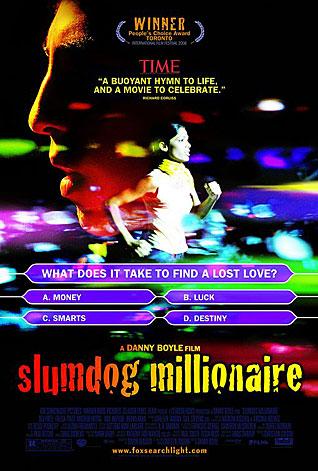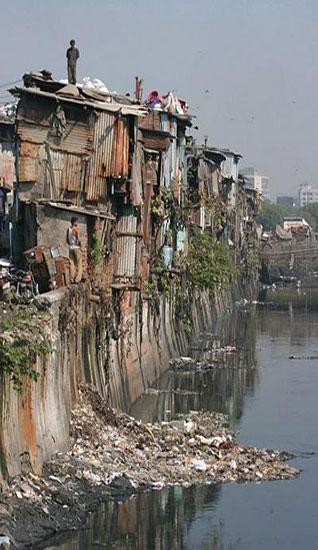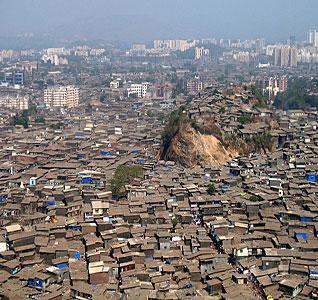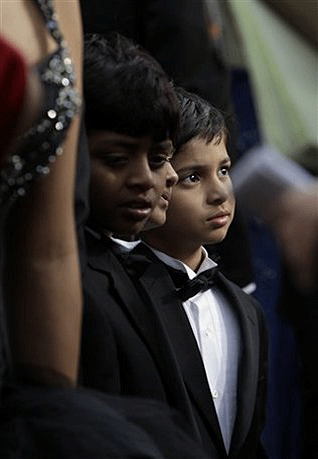
Below: 1st from bottom - Mumbai's slum children, lost in Hollywood. 2nd, 3rd from bottom - Where they came from! Mumbai boasts Asia's largest slum - the Dharavi Slums - where the 'Slumdog' story unfolds. 2nd photo from bottom: courtesy - Joel Newell.



Stuck
between
Fantasy&Reality
Current Events
Now, Will India Help its Teeming Poor?
by ARVINDER SINGH KANG
"I am Not a Dog", read one of the banners planted by protesters outside Anil Kapoor's Mumbai home.
The actor plays Prem Kumar, the game-show host in the movie Slumdog Millionaire (Slumdog), which has won tons of accolades, awards and praise worldwide.
There is - or was, until recently - no such English word as "slumdog". Director Danny Boyle combined the words "slum" and "underdog" for his movie plot of a poor slum dweller's rags-to-riches story.
In India, we have both of these in large numbers - slums as well as underdog achievers.
Slumdog has created quite a stir not only amongst international audiences but in India, as well.
Some members of both international and Indian audiences have praised it as "Charles Dickens for the 21st century" and "The film world's first globalized masterpiece", while others have protested and argued against it as being "Poverty for Sale."
This is not the first time some of my former countrymen have closed their eyes to reality. Amu was banned in India because it fearlessly and honestly addressed the 1984 anti-Sikh pogroms that raged in the heart of the country's capital.
Bombay, which mentioned Hindu-Muslim riots of Mumbai, was condemned.
Mohandas Gandhi once said: "An error does not become truth by reason of multiplied propagation, nor does truth become error because nobody sees it."
There is no doubt India is a vibrant and multicoloured country on the path of economic progress. It has seen tremendous growth, both in education and GDP in the last decade. Even in the slums, vibrant communities, micro-entrepreneurship and innovation are propelled by the needs of 1.13 billion people.
However, something that has not changed in that country over the years is the sense of false pride and the absence of moral responsibility in accepting their failures and shortcomings. Saying that the portrayal of India in Slumdog is disconnected with reality, would be a perfect example of hypocrisy.
Priti Patkar is a founder of Prerna, a non-governmental organization (NGO) which works to prevent commercial sexual exploitation of minors and young women and to eliminate second generation trafficking of children in Mumbai's teeming red light districts.
"There are people waiting to snatch up a girl by the time she is 12 or 13", she told National Public Radio (NPR) during an interview on February 19, 2009.
When asked about if Slumdog is an exaggeration and whether it puts India in bad light, she replied: "These are things you cannot hide, they are so obvious. You can walk down many streets of Mumbai and other cities in India and you can see it happens. You have to be totally indifferent, insensitive and blind not to see these things happening."
The title of the movie might not be perfectly balanced and sensitive towards the feelings of the oversensitive and the falsely patriotic in India.
However, Mumbai/Bollywood is the last place to talk about a balanced point-of-view. It has been consistently scurrilous to minorities and outsiders. Whites are shown as drunks, opportunists or simply promiscuous (Hum Dil De Chuke Sanam), Blacks are often portrayed as criminals and thugs (Apne), Muslims as patronizing Pakistan (Sarfarosh) and Sikhs as terrorists (Shootout at Lokhandwala) and party clowns (Raja Hindustani).
Most of the critics charging Slumdog with blasphemy missed out on the light the movie shed on NGO efforts to provide opportunities for kids in the slums. The school featured at the commencement of the film resembles an NGO called DoorSteps Schools, which conducts non-formal education classes for out-of-school and working children (7 to 18 years of age) residing in slums and on the pavements of Mumbai.
Slumdog has attracted the attention of the world and of Indians towards the miserable conditions of their fellow men and women - children! - in their own backyards.
There have been entrepreneurial efforts like Reality Tours and Travel, that "specialize in guided tours of Dharavi - Asia's biggest slum - a place of poverty and hardship but also a place of enterprise, humour and non-stop activity."
These agencies claim to donate 80% of profit to NGOs.
Beyond doubt, poverty-stricken areas exist in all parts of the world. So does human trafficking and underworld. I would assume the poor neighbourhoods of New York would have some, if not all, the problems described in Slumdog.
However, I have not seen critics complaining about a movie on a ghetto being "stereotypical portrayals of Americans".
Beautiful America exists beyond its ghettos and colourful India exists beyond its slums, even though in the latter case, the slums are the norm, not the aberration. We cannot accept one truth and deny the other.
Slumdog Millionaire cannot be entirely based on truth. It was a commercial project based on the modified version of Q & A, a work of fiction by an Indian diplomat and writer Vikas Swarup, and was not meant to be a documentary. And it isn't.
Here's the real tragedy:
The real facts, as prevalent in present-day India, are actually even more agonizing and horrible.
Most of the slum kids do not end up being as lucky as Jamaal and Latika, the lead characters in Slumdog Millionaire.
According to police statistics, 44,000 children disappear in India each year.
According to the Maharashtra state government - of the State of which Mumbai is the proud capital - beggars in Mumbai (mostly children) collect roughly $3.6 million annually. In Delhi, where an estimated 30,000 child beggars roam the streets, the figure is even higher, approaching $7 million annually, according to researchers.
In research for Human Rights Watch, Robert I. Freidman found: "There are approximately 10 million prostitutes in India. There are more than 100,000 women in prostitution in Mumbai alone, Asia's largest sex industry center. In Mumbai, 95% of the children of prostituted women become prostitutes. The red light district in Mumbai generates at least $400 million a year in revenue, with 100,000 prostitutes servicing men 365 days a year, averaging 6 customers a day, at $2 each." ["India's Shame: Sexual Slavery and Political Corruption Are Leading to An AIDS Catastrophe", The Nation]
As for those who someday get rescued, their fates are seldom any brighter. "Of the 218 Nepalese girls rescued in February 1996 from a Mumbai police raid, 60-70% of them were HIV positive." [Tim McGirk: "Nepal's Lost Daughters, India's Soiled Goods", Nepal/India News]
In the great Indian epic of Mahabharata, Yudhistra, the wise one, defined three kinds of people:
Doordarshi (forerunners) - They can premeditate the future and plan accordingly.
Samdarshi (well-informed) - They acknowledge the present and do their best to tackle the problem at hand.
Paardarshi (transparents) - These are the ones who don't acknowledge the present and ignore the past and the future. These become the cause of the demise of a civilization.
People who don't see Slumdog Millionaire as a true reflection of "Incredible India", fall into the third category.
[Arvinder Singh Kang is a 26-year-old Media and IT manager, geek, journalist and occasional writer. singh@arvinderkang.com]
February 22, 2009
Conversation about this article
1: Suzy Kaur (Oxford, England), February 23, 2009, 11:35 AM.
Good article.
2: Mukul (San Francisco, U.S.A.), February 24, 2009, 12:31 AM.
It was a very good article, for sure. An eye opener!
3: Gurjaspal Singh (San Jose, California, U.S.A.), February 24, 2009, 4:38 AM.
Awesome article.
4: Gurmeet Kaur (Atlanta, Georgia, U.S.A.), February 24, 2009, 9:52 AM.
Arvinder, Thank you for yet another beautiful writing. There is only one hope for India and that is "wanting to fix that is broken". The problem, as you have correctly identified is that India has too much false pride in its legacy and has closed its eyes towards anything that is broken. Beneath the art and the yoga simmer exploitation and genocides; but not many care. They are happy to enumerate the high GDP, the huge army laced with nuclear weapons, the IT boom and the most ancient culture that has supposedly shown the "West" any spirituality that it may have. It is the educated and selfless minds behind the NGOs such as the DoorStep schools that are its real hope. Do keep writing.
5: Varinder Singh Malhi (Freso, California, U.S.A.), February 24, 2009, 9:01 PM.
Great article! Keep writing.
6: H.Singh (Los Angeles, U.S.A.), February 25, 2009, 2:36 AM.
One can see how the Indian culture wars have started after the release of this movie. The right-wingers and Hindu fundamentalist forces protest against the use of the 'derogatory' word "dog" against all slum dwellers, who are also their power base and provoke their wrath on the West as another example of the West looking down upon India, in order to harden this misconceived Indian pride and to purge the western elements from its society. On the other hand, the progressive Congress claims good governance provided by them as a reason for bagging some many Oscars, which is quite a hyperbole.
7: Jaskaran Sarao (Bellevue, WA, U.S.A.), February 25, 2009, 1:29 PM.
Great article. I particularly like your listing of the three kinds of people ... and agree.
8: Christine Kaur (Houston, U.S.A.), February 25, 2009, 6:24 PM.
Very interesting and very true ... Indian fundamentalists can be so blind and oblivious to these things.
9: Navneet (Chandigarh, Punjab), February 27, 2009, 9:05 AM.
Another amazing article and an eye opener too ... Great job done, once again.
10: Stephen Goforth (Oxford, Mississippi, U.S.A.), March 01, 2009, 5:11 PM.
Well said! The film shines a light on an issue that needs to be addressed and for too long has remained in the dark. I appreciate the writer's willingness to make a call to action.


